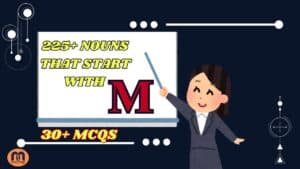Verbs That Start With L: Language is an ever-evolving tool, and verbs are the heartbeat of sentences, propelling ideas and actions forward.
Whether you’re a student looking to expand your vocabulary, a professional aiming to enhance your writing, or simply a language enthusiast, discovering new and varied verbs can significantly elevate your communication skills.
In this article, we’ll explore over 203+ verbs that start with the letter “L”, their meanings, and real-world examples, so you can incorporate them into your conversations and writing.
Why Verbs Matter
Verbs are the core of any sentence. They define the action or state of being and give life to a sentence. Without verbs, sentences would lack movement and meaning.
Having a diverse selection of verbs at your disposal allows you to express yourself more clearly and creatively. The letter “L” offers a treasure trove of verbs that can help you convey nuances, emotions, and ideas more effectively.
The Versatility of “L” Verbs
Verbs that start with the letter “L” cover a wide range of actions, from physical movements to emotional states to more abstract concepts. In this article, we will break down “L” verbs into manageable categories and provide you with examples and explanations.
Physical Actions
These verbs are associated with movements, either of the body or of objects, and can be easily used in both casual and formal contexts.
- Leap: To jump or spring a long distance.
- Example: The athlete leaped over the hurdle with ease.
- Lift: To raise or elevate something.
- Example: She lifted the box onto the shelf.
- Limp: To walk with difficulty due to injury or pain.
- Example: After spraining his ankle, he limped to the clinic.
- Lounge: To sit or lie in a relaxed way.
- Example: He lounged on the sofa, enjoying his day off.
Communication Verbs
Verbs in this category involve expressing thoughts, ideas, or emotions, which are crucial in both personal and professional settings.
- Lecture: To give a formal speech or presentation, often in an educational context.
- Example: The professor lectured on the importance of sustainability.
- Listen: To pay attention to sound.
- Example: She listened carefully to the speaker’s advice.
- Lament: To express grief or sorrow.
- Example: He lamented the loss of his childhood home.
Mental and Emotional States
These verbs describe how we feel or think, often conveying complex emotional experiences.
- Long: To yearn or desire intensely.
- Example: She longed for a quiet vacation away from the chaos of the city.
- Learn: To acquire knowledge or skills through experience or study.
- Example: I learned a lot from that challenging project.
- Lurk: To remain hidden, often with negative connotations (i.e., a threat or danger).
- Example: The figure lurked in the shadows, waiting for the right moment.
Creation and Transformation
Verbs in this section involve bringing something into existence or changing its form, shape, or condition.
- Labour: To work hard or engage in physical effort.
- Example: The workers labored all day to finish the construction project.
- Launch: To begin or introduce something, such as a product, idea, or event.
- Example: The company launched a new line of eco-friendly products.
- Light: To make something brighter by adding light.
- Example: She lit the candles to create a cozy atmosphere.
Abstract and Conceptual Actions
These verbs help in describing more abstract ideas and concepts, making them essential in academic, creative, and philosophical writing.
- Lessen: To reduce or make something smaller or less intense.
- Example: The pain in his back lessened after he took the medication.
- Linger: To stay longer than expected or desired.
- Example: She lingered at the café, enjoying her coffee.
- Link: To connect or associate things together.
- Example: The documentary linked the rise of technology with societal changes.
Verbs for Progress and Movement
These verbs describe a sense of forward motion, either literally or figuratively, and are essential for describing change, growth, or advancement.
- Launch: To initiate or set something into motion, like starting a business, event, or project.
- Example: The company plans to launch a new app next month.
- Lead: To guide or direct someone or something in a particular direction.
- Example: She leads the team with exceptional strategic insight.
- Leverage: To use something to its maximum advantage.
- Example: The company is leveraging its resources to expand into new markets.
Verbs for Giving and Receiving
Many verbs in this category deal with the exchange of objects, information, or energy. They are useful when describing transactions, communication, and interaction.
- Lend: To give something temporarily with the expectation of it being returned.
- Example: I’ll lend you my notes for the meeting.
- Loan: To provide money or goods temporarily, with an agreement for repayment.
- Example: The bank approved the loan for the new business venture.
- Lease: To rent something, usually property, for a long-term period.
- Example: We decided to lease the office space for five years.
Verbs for Conflict and Resolution
Some “L” verbs capture the nuances of conflict, tension, and the efforts made to resolve such situations. These verbs can be particularly effective when discussing negotiation, confrontation, or reconciliation.
- Lash: To strike with a forceful motion, often used metaphorically in the sense of verbal attacks.
- Example: He lashed out in frustration after hearing the news.
- Lock: To secure something in place, often preventing access or use.
- Example: Make sure to lock the door when you leave the office.
- Liberate: To set someone or something free from oppression or confinement.
- Example: The workers’ union helped liberate the employees from unfair conditions.
Verbs of Observation and Reflection
Some verbs starting with “L” are used to describe the act of observing, thinking, or reflecting, which are central to personal development, decision-making, and insight.
- Look: To observe something carefully or direct one’s gaze.
- Example: He looked at the map to find the best route.
- Learn: To acquire new knowledge or skills, crucial in both educational and personal growth contexts.
- Example: I learn new things every day from my colleagues.
- Loiter: To hang around in a place without a clear purpose, often in a manner that’s seen as idle or unnecessary.
- Example: The children loitered around the park after school.
Verbs of Feeling and Desire
Feelings, desires, and emotional expressions play an essential role in human communication. These verbs allow us to articulate various internal states in ways that connect with others emotionally.
- Love: To have a deep affection for someone or something.
- Example: She loves her work and always puts in her best effort.
- Lust: To have a strong and often overpowering desire, typically related to physical attraction.
- Example: The novel explored themes of love and lust between the two characters.
- Languish: To suffer from being in a state of neglect, sadness, or discomfort.
- Example: He languished in the hospital room, waiting for news on his condition.
Verbs of Influence and Impact
Some “L” verbs describe actions that have an impact or influence on people, situations, or things. These verbs are essential in describing leadership, control, and persuasive actions.
- Legislate: To make or enact laws, typically within a formal government context.
- Example: The government plans to legislate stricter environmental policies.
- Lobby: To attempt to influence the decisions of government officials or legislators.
- Example: The company hired a firm to lobby for a change in trade regulations.
- Levitate: To rise or float in the air, often as if defying gravity. This verb has both a literal and figurative sense (e.g., rising above challenges).
- Example: The magician made the object levitate with a wave of his hand.
Verbs for Social Interaction and Relationships
Some “L” verbs deal directly with human interaction and social dynamics, helping to illustrate how we connect with others.
- Link: To connect or associate two or more things, ideas, or people.
- Example: The research links air pollution with heart disease.
- Linger: To stay in one place for longer than expected, often due to reluctance or enjoyment.
- Example: They lingered at the café, savoring the conversation.
- Laugh: To express happiness, amusement, or joy with audible sounds.
- Example: The comedian’s jokes made everyone laugh out loud.
Verbs for Everyday Actions
These verbs are commonly used in daily life and are essential for practical, routine activities. They help bring simple, ordinary moments to life.
- Lock: To secure something, typically with a key or mechanism.
- Example: Don’t forget to lock the door before you leave the house.
- Lay: To place something down in a particular position.
- Example: Lay the book on the table when you’re done reading.
- Look: To direct your gaze at something.
- Example: Look at those beautiful paintings on the wall.
Verbs for Persuasion and Influence
These verbs revolve around the art of influencing others, whether through persuasion, encouragement, or manipulation. They are particularly important in business, negotiations, and even personal relationships.
- Lure: To attract or entice someone to a particular place or situation, often with the promise of something desirable.
- Example: The fisherman used bright-colored bait to lure the fish.
- Lobby: To attempt to influence government policy or decisions through advocacy and persuasion.
- Example: Environmental groups lobby for stronger climate change laws.
- Lend: To provide something temporarily, often with the expectation of a return.
- Example: I’ll lend you my pen if you need it for the exam.
Verbs for Disruption and Change
These verbs describe actions that disrupt the current state of affairs, whether through innovation, conflict, or evolution. They are excellent for discussing transformations and shifts in various domains.
- Libel: To publish false information that damages a person’s reputation (legal context).
- Example: The journalist was sued for libeling the public figure.
- Lift: To raise or elevate something, sometimes used figuratively to suggest elevating a situation or mood.
- Example: The motivational speaker’s words lifted everyone’s spirits.
- Lash: To strike with force, often used metaphorically to describe verbal attacks or aggressive actions.
- Example: She lashed out at her colleague after the argument.
Verbs for Reflection and Thought
Some “L” verbs are perfect for conveying deeper levels of thinking, introspection, and philosophical considerations. These verbs are valuable in discussions of mental states and contemplative activities.
- Look: To examine or consider something carefully.
- Example: He looked at the problem from every angle before deciding on a solution.
- Lament: To express grief or sorrow over something lost or undesired.
- Example: The community lamented the destruction caused by the storm.
- Learn: To gain knowledge or understanding through experience, study, or teaching.
- Example: We learn best when we are actively engaged in the subject matter.
Verbs for Acceleration and Speed
Certain “L” verbs emphasize rapid action, movement, or progress. These verbs are useful when describing quick actions or events that happen in a short time frame.
- Launch: To send something into motion or activity, often used in the context of events or product releases.
- Example: The company plans to launch the new website next week.
- Lunge: To make a sudden forward movement, often with force or purpose.
- Example: He lunged at the ball just before it crossed the goal line.
- Leap: To jump a great distance or to make a bold or quick transition.
- Example: She leaped over the puddle without missing a step.
Verbs for Interaction with Objects
Many “L” verbs describe actions that involve objects or things in the physical world. These verbs are used to convey the manipulation or movement of items and materials.
- Lift: To raise or elevate something, such as lifting an object off the ground.
- Example: She struggled to lift the heavy suitcase into the overhead compartment.
- Lower: To bring something down from a higher position.
- Example: He carefully lowered the box to the ground to avoid damaging it.
- Label: To attach a tag or mark that provides information about an object or product.
- Example: She labeled all the files for easier organization.
Verbs for Managing or Controlling
These verbs describe how we take charge of or maintain control over situations, tasks, or objects. They are useful when discussing leadership, authority, and management.
- Lead: To guide, direct, or take charge of a group or process.
- Example: The CEO leads the company with a strong vision for the future.
- Lessen: To reduce or decrease in size, intensity, or amount.
- Example: The manager worked to lessen the workload of his team by delegating tasks more efficiently.
- Level: To make something even or flat; can also mean to bring something to an equal position or status.
- Example: The workers leveled the ground before starting construction on the new building.
Verbs for Time and Timing
Some “L” verbs help convey the concept of timing whether it’s about the right moment to act, a delay, or a period of waiting.
- Lag: To fall behind in movement, progress, or development.
- Example: The team lagged behind in completing the project on time.
- Last: To endure or remain in existence for a specified period of time.
- Example: The effects of the medication lasted for several hours.
- Live: To experience life or exist in a specific way.
- Example: They lived in the city for five years before moving to the countryside.
Verbs for Control and Management
These verbs reflect actions associated with the control, direction, and oversight of people, situations, or objects. They’re vital in professional and personal contexts when it comes to authority and governance.
- Lead: To guide, direct, or show the way, typically in a leadership role.
- Example: The manager leads the team through challenging projects with great determination.
- Level: To make something equal or flat, often used in contexts of fairness or balance.
- Example: The contractor leveled the surface of the driveway to ensure proper drainage.
- Lasso: To catch or control something, often with a rope, used figuratively for managing difficult situations.
- Example: She managed to lasso the situation before it got out of hand.
Verbs for Mental and Cognitive Processes
When dealing with thought, understanding, and reflection, these “L” verbs help communicate mental efforts, focusing on learning, remembering, and comprehending.
- Learn: To acquire knowledge or skills through study, experience, or teaching.
- Example: I learned a lot from attending that conference.
- Look: To observe or examine with intent.
- Example: Look at the data and analyze the trends carefully before making decisions.
- Lurk: To remain hidden while observing, often with a connotation of suspicion or deceit.
- Example: The spy lurked in the shadows, waiting for the right moment to strike.
Verbs for Disruption and Impact
Some “L” verbs suggest actions that interrupt, disturb, or alter the current state of affairs, indicating some form of disturbance or forceful change.
- Lacerate: To tear or deeply cut something, typically used in physical or metaphorical contexts.
- Example: His harsh words lacerated her feelings and left her heartbroken.
- Libel: To defame or slander through written or published statements.
- Example: The newspaper was sued for libeling the celebrity with false accusations.
- Lash: To strike out or whip, often symbolizing anger, force, or quick retaliation.
- Example: The waves lashed against the shore during the storm.
Verbs for Artistic and Creative Expression
In the world of art, creativity, and expression, “L” verbs help convey processes involved in making, changing, or manipulating art, music, and performances.
- Linger: To remain in a state of enjoyment or reflection, often referring to a lingering atmosphere or feeling.
- Example: The scent of fresh flowers lingered long after she left the room.
- Liven: To bring to life or make something more energetic, exciting, or spirited.
- Example: The music livened up the entire party and got everyone dancing.
- Layer: To arrange or stack things on top of one another, often used in creating visual depth or texture.
- Example: The artist layered the paint to create a rich, textured surface.
Verbs for Emotional Expression and Reaction
Emotions and reactions can be expressed through a range of “L” verbs, helping to convey a deeper understanding of feelings and emotional states.
- Lament: To express grief, sorrow, or regret, often for something lost or unattainable.
- Example: He lamented the passing of his childhood and the simpler days.
- Long: To desire or yearn for something deeply and persistently.
- Example: She longed for a return to the days of carefree youth.
- Lust: To experience a powerful, often overwhelming desire, typically related to physical attraction.
- Example: He lusted after the car he saw in the showroom window.
Verbs for Movement and Travel
In addition to physical actions, some “L” verbs are ideal for describing movement, travel, or changes in position whether literal or metaphorical.
- Limp: To walk with difficulty due to pain, injury, or weakness.
- Example: After twisting his ankle, he limped across the street.
- Lurch: To move suddenly or with an abrupt, uneven motion.
- Example: The ship lurched as it hit a wave, causing everyone to lose their balance.
- Leeway: To allow for flexibility or freedom of movement in decisions or actions.
- Example: The project manager gave the team some leeway in deciding how to approach the task.
Verbs for Health and Recovery
These verbs describe actions that relate to healing, improvement, or care, often dealing with physical or mental well-being.
- Languish: To suffer or weaken, often due to illness or prolonged neglect.
- Example: He languished in bed for weeks, recovering from the surgery.
- Lessen: To reduce in intensity, often related to symptoms, pain, or negative emotions.
- Example: The medication helped lessen the pain from the injury.
- Lift: To improve someone’s spirits or mood, providing a sense of well-being.
- Example: The counselor’s advice helped lift her spirits during a difficult time.
Verbs for Leadership and Guidance
“Leadership” verbs can be essential when talking about guiding, directing, or motivating others. These verbs are often used in business, education, and management contexts.
- Lead: To show the way by going ahead or to guide others in a particular direction.
- Example: She leads her department with great efficiency and clarity.
- Liaise: To communicate or cooperate with others to ensure smooth operation or mutual understanding.
- Example: The project manager will liaise with the client to finalize the details.
- Leverage: To use resources, influence, or opportunities to maximum advantage.
- Example: The company leveraged its global presence to expand into new markets.
Verbs for Creating and Building
Many “L” verbs can be associated with creation, construction, and development. These verbs are invaluable when discussing growth, invention, or improvement in any area, whether it’s physical, mental, or conceptual.
- Launch: To initiate or start something, particularly large-scale endeavors like projects, products, or even rockets.
- Example: The tech company plans to launch a new software update next month.
- Loom: To appear as a large, often indistinct shape, typically from a distance, suggesting an impending or looming event.
- Example: Dark clouds loomed on the horizon, signaling the storm was near.
- Layer: To arrange in layers, often used to describe constructing something step by step, whether it’s in cooking, design, or data.
- Example: The chef layered the ingredients carefully to create a delicious dish.
Verbs for Risk and Danger
Certain “L” verbs also relate to danger, risk, and exposure, often invoking feelings of fear or caution. These verbs can help describe situations that are precarious or filled with uncertainty.
- Lurk: To hide while waiting for an opportunity to strike or cause harm, often used in both literal and figurative contexts.
- Example: The predator lurked in the bushes, waiting for the right moment to pounce.
- Lash: To strike or beat with force, often in reference to violent actions or strong forces of nature.
- Example: The wind lashed against the windows during the storm, rattling the entire house.
- Leap: To take a risk by jumping or moving abruptly from one state or condition to another.
- Example: He decided to leap into the unknown by moving to a new city without a job lined up.
Verbs for Communication and Expression
“Communication” is a vital part of daily life, and there are several “L” verbs that help articulate the ways we exchange information, ideas, and emotions.
- Lament: To express grief or sorrow over something lost, often shared in conversation or writing.
- Example: She lamented the loss of her childhood home, reminiscing about the happy memories.
- Lecture: To deliver an educational talk or presentation, often with the intent of instructing or informing.
- Example: The professor lectured on the impact of climate change during the seminar.
- Lisp: To speak with a speech impediment, where certain sounds (like “s” or “z”) are pronounced differently.
- Example: The child with a lisp found it challenging to pronounce certain words clearly.
Verbs for Changing States and Transformation
When it comes to shifting, evolving, or transitioning from one state to another, “L” verbs play a key role in describing those changes, whether they’re subtle or drastic.
- Lighten: To make lighter, either physically or in mood or atmosphere, often to reduce weight or improve emotional states.
- Example: The mood lightened when the team heard the good news.
- Lessen: To reduce in intensity, size, or severity, often used in contexts of improvement or alleviation.
- Example: Medication helped lessen the pain in his leg after the injury.
- Levitate: To rise or float in the air, often associated with supernatural or magical phenomena but also used in a figurative sense for something that seems to be lifted effortlessly.
- Example: The magician made the ball levitate above the table, astonishing the audience.
Verbs for Movement and Progression
Movement, both literal and metaphorical, is central to understanding how things change, develop, or advance. These verbs focus on actions that involve moving forward, advancing, or transitioning between different stages.
- Leverage: To use something to its maximum advantage, often in the context of gaining power, influence, or resources.
- Example: The company leveraged its resources to expand into international markets.
- Limp: To walk with difficulty, usually due to injury or physical limitation, often indicating a sense of struggle or limitation.
- Example: After the accident, he had to limp to the nearest bus stop.
- Launch: To begin or start something, such as a project, event, or product.
- Example: The company plans to launch their new app at the tech conference.
Verbs for Psychological and Emotional States
Language also has the power to convey our mental and emotional states, and certain “L” verbs are perfect for capturing the complexity of human emotions, moods, and behaviors.
- Lust: To feel a strong, intense desire for something or someone, often linked with passion or craving.
- Example: He lusted after success and worked tirelessly to achieve his goals.
- Long: To feel a deep yearning or desire for something that may be unattainable.
- Example: She longed for a return to simpler, more peaceful times.
- Languish: To suffer or become weak, either physically or emotionally, often from prolonged neglect or illness.
- Example: He languished in bed, feeling hopeless and ill.
Verbs for Activities and Hobbies
Whether it’s leisure activities or more dedicated hobbies, “L” verbs are integral in describing pastimes and recreational endeavors that enrich our daily lives.
- Learn: To gain knowledge or skills, often through study or practice.
- Example: She learned how to play the piano in just a few months.
- Listen: To give attention to sound or to hear carefully, often with the intent of understanding.
- Example: He listened to music while relaxing on the couch.
- Lurk: While often negative in connotation, it can also apply to digital spaces or online communities where individuals observe without participating.
- Example: He liked to lurk in the forums, reading conversations without contributing.
Verbs for Nature and Environment
In describing the natural world, many “L” verbs are used to talk about environmental phenomena or the actions that affect the landscape.
- Lash: To strike with force, especially when describing the power of natural forces like wind or rain.
- Example: The waves lashed against the cliffside, eroding the rocks over time.
- Leaf: To move through pages of a book or document, typically used in the context of exploring written works.
- Example: She leafed through the old photo album, recalling memories of her childhood.
- Lumber: To move slowly and heavily, often used to describe the movement of animals or large, cumbersome objects.
- Example: The bear lumbered through the forest, searching for food.
Verbs for Conflict and Confrontation
Many “L” verbs are also relevant when discussing tensions, conflicts, and direct confrontations, whether physical or ideological.
- Lash: To strike or criticize with great intensity, especially in moments of anger.
- Example: He lashed out at his colleague during the heated argument.
- Lurk: To remain hidden or wait for the right opportunity to attack, often used in contexts involving danger or threat.
- Example: The criminal lurked in the alley, waiting for a chance to strike.
- Leverage: To use something to gain power or advantage in a conflict or negotiation.
- Example: The company used its market position to leverage better deals from suppliers.
Verbs for Interactions and Social Engagement
Social interactions often require verbs that describe the ways in which we communicate, connect, or engage with others. “L” verbs are essential for capturing the subtleties of social behavior, influence, and relationships.
- Linger: To stay in one place longer than necessary, often due to enjoyment, hesitation, or reluctance to leave.
- Example: She lingered by the door, not wanting to say goodbye to her friends just yet.
- Liaise: To communicate or work together, especially for coordination or mutual benefit.
- Example: The marketing team will liaise with the sales department to finalize the campaign.
- Leech: To drain resources or benefits from someone or something, often in a parasitic or exploitative manner.
- Example: The employee seemed to leech off the hard work of his colleagues, taking credit for their ideas.
Verbs for Strength and Force
Some “L” verbs are particularly effective at describing physical and metaphorical strength, energy, and force. These verbs are used in both literal and figurative contexts to convey intensity, power, and determination.
- Lift: To raise something or someone, whether physically, emotionally, or metaphorically.
- Example: His kind words lifted her spirits during a difficult time.
- Lash: To strike or hit with great force, often used to describe violent actions or the impact of natural forces.
- Example: The thunder lashed against the windows, rattling the entire house.
- Lunge: To make a sudden, forceful movement, often associated with a physical attack or a leap forward.
- Example: The cat lunged at the toy, pouncing swiftly and gracefully.
Verbs for Thought and Reasoning
Thinking and reasoning are central to understanding and decision-making, and there are “L” verbs that capture different cognitive actions. These verbs help us explain the ways we reflect, deduce, and process information.
- Learn: To gain knowledge or skills through study, experience, or teaching.
- Example: I learned a lot from reading those articles on personal finance.
- Look: To direct your eyes at something, often used metaphorically to indicate observation or consideration.
- Example: Look at this diagram and let me know what conclusions you can draw from it.
- Lament: To express sorrow, grief, or regret, often by reflecting on a loss or missed opportunity.
- Example: He lamented the missed opportunity to travel abroad during his summer break.
Verbs for Creating and Shaping
In both art and construction, “L” verbs help us describe the actions of creating, shaping, and transforming. These verbs are useful in contexts that involve forming or altering something from one state to another.
- Lace: To weave or intertwine, often used in the context of adding detail to something or binding things together.
- Example: She laced the shoes tightly, ensuring a secure fit for the race.
- Leverage: To use something to gain a greater advantage or impact.
- Example: The company leveraged new technology to streamline production.
- Level: To make something even, flat, or aligned, especially in the context of construction or measurement.
- Example: The builder leveled the ground before laying the foundation for the house.
Verbs for Reactions and Responses
In life’s many situations, reactions are just as important as the actions that prompt them. “L” verbs are well-suited to describe the variety of responses we give to external stimuli or emotional experiences.
- Leap: To jump or spring forward, often used to describe rapid or dramatic movements.
- Example: The athlete leapt over the hurdle with incredible speed.
- Lash: To react forcefully, often associated with anger or frustration.
- Example: She lashed out when she heard the news about the promotion.
- Linger: To delay or remain in a situation, often due to reluctance or hesitation.
- Example: He lingered in the hallway, unsure if he should knock on the door.
Verbs for Risk and Exploration
Exploration and the willingness to take risks are vital elements of human experience. “L” verbs help capture the actions and attitudes related to venturing into the unknown.
- Leap: To take a bold or risky step forward, typically with excitement or uncertainty.
- Example: They decided to leap into the world of entrepreneurship and start their own business.
- Lurk: To wait in secrecy or remain hidden, often with the intention of observing or taking advantage of an opportunity.
- Example: The thief lurked in the alley, waiting for the right moment to strike.
- Lumber: To move slowly and heavily, often used to describe exploration or the movement of large objects or beings.
- Example: The elephant lumbered through the forest, making its way to the river.
Verbs for Improvement and Healing
Healing and improvement are central to growth, both physically and mentally. “L” verbs in this category help express the process of recovery, enhancement, and moving toward a better state.
- Lessen: To reduce in size, extent, or severity, often used in the context of mitigating pain, stress, or damage.
- Example: Meditation helped lessen her anxiety and brought a sense of peace.
- Lift: To elevate or raise something, either physically or in terms of mood.
- Example: The news of her promotion lifted her spirits and gave her a sense of accomplishment.
- Languish: To suffer or waste away, often used to describe the gradual decline of health or well-being.
- Example: He languished in the hospital bed, struggling to regain his strength.
Verbs for Leadership and Influence
In leadership and management, “L” verbs are often used to describe the ways in which one leads, guides, or influences others. These verbs carry connotations of authority, responsibility, and direction.
- Lead: To guide, direct, or influence others, often in a leadership capacity.
- Example: The CEO led the company through a difficult period of financial instability.
- Leverage: To use influence or resources strategically to gain an advantage.
- Example: The manager leveraged his experience to secure a new client for the firm.
- Liaise: To act as a link or intermediary between groups, facilitating communication or cooperation.
- Example: The project coordinator liaised with various departments to ensure project success.
Commonly Used “L” Verbs in Daily Life
Some verbs starting with “L” are used frequently in both everyday conversations and more formal settings. Here are a few you’ll want to keep handy in your vocabulary toolkit:
- Look: To direct one’s gaze in a particular direction.
Example: Look at that beautiful painting! - Love: To feel deep affection or attachment to someone or something.
Example: I love spending time with my family. - Live: To remain alive or to experience life.
Example: They live in a small town near the coast.
Actionable Tips for Using “L” Verbs in Writing and Conversation
- Be Descriptive: Using more specific verbs, such as “leap” instead of “jump” or “lament” instead of “complain,” can instantly make your writing more vivid.
- Vary Your Language: Avoid using the same verbs repeatedly. A rich vocabulary makes your speech and writing more engaging and enjoyable.
- Master the Nuances: Some “L” verbs carry unique connotations, like “lurk,” which implies secrecy or danger, and “long,” which evokes a deep, emotional desire. Understanding their nuances can make your communication more precise.
Conclusion
The letter “L” offers a wealth of expressive verbs, making it an excellent source for those looking to expand their vocabulary. Whether you’re aiming to enhance your writing, add color to your speech, or simply enjoy the beauty of the English language, the verbs that start with “L” provide endless possibilities.
The next time you’re crafting a sentence, remember these verbs can elevate your message, whether you’re leaping into a new idea, lamenting a loss, or simply living in the moment.
Take the time to experiment with these verbs in your daily conversations and writing. With over 203+ examples to choose from, you’re sure to find the perfect verb to express your thoughts in a more vivid and powerful way. [Verbs That Start With L]
MCQs Quiz: Verbs That Start With L
1. Which of the following “L” verbs means to initiate or begin something?
a) Leverage
b) Launch
c) Linger
d) Languish
Answer:
b) Launch
- “Launch” means to begin or start something, such as a project, product, or event.
2. What does the verb “Linger” describe?
a) Moving quickly from one point to another
b) Remaining in one place longer than necessary
c) Striking with great force
d) An emotional response to a loss
Answer:
b) Remaining in one place longer than necessary
- “Linger” refers to staying in one place for longer than necessary, often due to enjoyment or hesitation.
3. Which of the following verbs would most likely describe a sudden, forceful movement?
a) Level
b) Leap
c) Lurk
d) Lament
Answer:
b) Leap
- “Leap” means to jump or spring forward suddenly and forcefully.
4. What is the meaning of the verb “Lash” in the context of nature or weather?
a) To cut or shape
b) To strike or whip with force
c) To observe something carefully
d) To make something lighter or less intense
Answer:
b) To strike or whip with force
- “Lash” refers to striking or whipping with great force, often used to describe the impact of natural forces like wind or rain.
5. Which verb means to reduce the intensity or severity of something?
a) Languish
b) Lessen
c) Loom
d) Latch
Answer:
b) Lessen
- “Lessen” means to reduce in intensity, size, or severity, especially in the context of alleviating pain or discomfort.
6. Which “L” verb is used to describe a person who is hiding, waiting for an opportunity to act?
a) Leverage
b) Lurk
c) Listen
d) Languish
Answer:
b) Lurk
- “Lurk” means to hide or remain concealed, often with the intent to strike or take advantage of a situation.
7. Which of the following is a verb that describes the act of gaining knowledge through study or experience?
a) Listen
b) Learn
c) Lament
d) Linger
Answer:
b) Learn
- “Learn” means to acquire knowledge or skills, often through study, practice, or experience.
8. Which of the following “L” verbs describes to guide or influence others?
a) Languish
b) Level
c) Lead
d) Lurk
Answer:
c) Lead
- “Lead” refers to guiding, directing, or influencing others, especially in a leadership capacity.
9. What does the verb “Languish” typically refer to?
a) Experiencing growth or improvement
b) Being in a state of physical or emotional suffering or decline
c) Moving swiftly and lightly
d) Striking or hitting with force
Answer:
b) Being in a state of physical or emotional suffering or decline
- “Languish” refers to a gradual decline, often due to neglect, illness, or emotional suffering.
10. Which “L” verb is used to describe the act of elevating or raising something, either physically or in terms of mood?
a) Lament
b) Linger
c) Lift
d) Lurk
Answer:
c) Lift
- “Lift” means to raise or elevate something, whether physically or to improve someone’s mood or situation.
11. What is the meaning of the verb “Leverage”?
a) To communicate with others
b) To use something to gain an advantage or increase power
c) To remain hidden for an opportunity
d) To lessen the impact of something
Answer:
b) To use something to gain an advantage or increase power
- “Leverage” refers to using a resource, position, or influence to gain a greater advantage or impact.
12. Which verb would you use to describe a significant or dramatic jump forward in progress or action?
a) Limp
b) Linger
c) Leap
d) Level
Answer:
c) Leap
- “Leap” refers to a sudden and often dramatic forward movement, either physically or metaphorically.
13. In the context of leadership, what does it mean to “Liaise”?
a) To lead others in a group
b) To manage a project or event
c) To communicate or cooperate with others for coordination
d) To ignore requests or opportunities
Answer:
c) To communicate or cooperate with others for coordination
- “Liaise” means to facilitate communication or cooperation between different groups or individuals.
14. Which of the following “L” verbs describes the act of preparing or organizing something evenly or flatly?
a) Level
b) Loom
c) Lash
d) Lurk
Answer:
a) Level
- “Level” means to make something even, flat, or aligned, typically in construction or measurement contexts.
15. Which “L” verb refers to a strong desire or craving for something, often used in a passionate context?
a) Lust
b) Languish
c) Linger
d) Lament
Answer:
a) Lust
- “Lust” refers to an intense, often uncontrollable desire or craving for something or someone.
16. Which “L” verb refers to the process of making something lighter or less heavy, both physically and metaphorically?
a) Languish
b) Lighten
c) Loom
d) Lurk
Answer:
b) Lighten
- “Lighten” means to make something less heavy or intense, either physically (like lightening a load) or emotionally (like lightening someone’s mood).
17. What does the verb “Lament” typically mean?
a) To make plans for the future
b) To express grief or sorrow
c) To move quickly
d) To take action in a difficult situation
Answer:
b) To express grief or sorrow
- “Lament” means to express sorrow or regret, often in response to a loss or disappointment.
18. Which verb would best describe the act of becoming gradually more visible or significant over time?
a) Linger
b) Level
c) Loom
d) Lurk
Answer:
c) Loom
- “Loom” refers to something that gradually becomes more visible or threatens to appear, often in a large or significant way.
19. What is the meaning of the verb “Latch”?
a) To fasten or secure something
b) To seek out or chase
c) To remain inactive
d) To evaluate critically
Answer:
a) To fasten or secure something
- “Latch” means to secure or fasten something, usually with a mechanism that keeps it in place.
20. Which verb means to move with difficulty or in a slow, unsteady way?
a) Limp
b) Lift
c) Lurk
d) Linger
Answer:
a) Limp
- “Limp” refers to moving in an uneven, often painful way, typically due to injury or discomfort.
21. Which of the following “L” verbs means to form or arrange something in a particular order or alignment?
a) Languish
b) Level
c) Launch
d) Linger
Answer:
b) Level
- “Level” means to make something even, aligned, or organized, often in the context of surfaces or structures.
22. What does the verb “Lurk” suggest about someone’s actions or behavior?
a) To act openly and confidently
b) To remain hidden and wait for an opportunity
c) To express sadness or despair
d) To act in a playful and carefree manner
Answer:
b) To remain hidden and wait for an opportunity
- “Lurk” suggests staying hidden or being stealthy, often with an intention to surprise or take advantage of a situation.
23. Which verb means to cause something to be in a state of confusion or disorder?
a) Leap
b) Languish
c) Level
d) Lark
Answer:
b) Languish
- “Languish” refers to a state of suffering or neglect, but it can also refer to a situation or person being left in a disordered, declining state.
24. What does it mean to “Lessen” something?
a) To increase it
b) To reduce or decrease it
c) To make it louder
d) To make it more complex
Answer:
b) To reduce or decrease it
- “Lessen” means to diminish, reduce, or decrease in terms of quantity, intensity, or severity.
25. Which verb would you use to describe making something appear less serious or troubling?
a) Lighten
b) Lurk
c) Languish
d) Level
Answer:
a) Lighten
- “Lighten” means to make something seem less serious, heavy, or intense, either physically or emotionally.
26. Which verb refers to causing someone to feel sad or regretful about something?
a) Lurk
b) Lament
c) Leverage
d) Linger
Answer:
b) Lament
- “Lament” means to express sorrow, regret, or grief, often about a loss or unfortunate event.
27. What does the verb “Loom” generally describe?
a) The action of resting
b) A sudden and alarming appearance of something large or threatening
c) To stay in a particular location for a long time
d) To make something appear less important
Answer:
b) A sudden and alarming appearance of something large or threatening
- “Loom” often refers to something becoming visible in a way that suggests it will be significant or cause concern.
28. Which of the following “L” verbs means to express excitement or admiration for something?
a) Lament
b) Lust
c) Lurk
d) Laugh
Answer:
d) Laugh
- “Laugh” means to express amusement or joy, often in response to humor or something pleasing.
29. Which verb describes the action of organizing or preparing something systematically?
a) Level
b) Lurk
c) Launch
d) Liaise
Answer:
a) Level
- “Level” can refer to organizing or aligning things evenly, whether in construction, measurement, or metaphorically in terms of organizing information.
30. What does it mean to “Latch” something?
a) To ignore it
b) To grasp or hold onto it
c) To secure or fasten it
d) To destroy it
Answer:
c) To secure or fasten it
- “Latch” refers to locking or securing an item, often with a clasp or bolt.
31. Which verb means to make use of something to gain a specific advantage?
a) Level
b) Lurk
c) Leverage
d) Linger
Answer:
c) Leverage
- “Leverage” means to use a resource, asset, or position to gain an advantage or increase power.
32. What does it mean to “Lurk” in a figurative sense?
a) To join in with a group of people
b) To observe something without drawing attention
c) To move quickly and openly in a space
d) To avoid interacting with others
Answer:
b) To observe something without drawing attention
- “Lurk” refers to staying hidden, often while observing a situation or others without them noticing.
33. Which of the following verbs describes the act of feeling or showing deep sorrow for something?
a) Languish
b) Linger
c) Lament
d) Level
Answer:
c) Lament
- “Lament” refers to expressing grief, sorrow, or regret, particularly in response to a loss or misfortune.
34. Which verb would be most appropriate when referring to taking a quick and decisive action?
a) Leap
b) Level
c) Lurk
d) Linger
Answer:
a) Leap
- “Leap” refers to making a sudden, significant movement or taking a quick, decisive action.
35. What does the verb “Languish” often refer to?
a) To experience continuous improvement
b) To slowly decline or suffer, especially due to neglect
c) To move swiftly from one point to another
d) To express joy or celebration
Answer:
b) To slowly decline or suffer, especially due to neglect
- “Languish” refers to a state of suffering, decline, or stagnation, often due to neglect or lack of care.
36. Which verb means to remove something or someone from a position of danger or difficulty?
a) Lift
b) Level
c) Lurk
d) Lament
Answer:
a) Lift
- “Lift” can mean to physically raise something from a lower position, or metaphorically, to help someone out of a difficult or negative situation.
37. Which of the following verbs describes a person who avoids direct confrontation or does not express their feelings?
a) Lurk
b) Linger
c) Lament
d) Leverage
Answer:
a) Lurk
- “Lurk” can describe a person who stays hidden, avoiding direct interaction or confrontation.
38. What does it mean to “Level” something in terms of fairness or equality?
a) To divide it equally
b) To make it even and balanced
c) To add extra weight or importance
d) To create a hierarchical system
Answer:
b) To make it even and balanced
- “Level” means to bring something into alignment or make it equal, often used when making surfaces flat or situations fair.
39. Which verb means to experience a sudden and intense surge of emotion or desire?
a) Lust
b) Leap
c) Linger
d) Lurk
Answer:
a) Lust
- “Lust” refers to a strong, often overwhelming desire, particularly in terms of passion or craving.
40. What does the verb “Liaise” typically mean in a professional context?
a) To ignore someone’s requests
b) To create a hierarchical system
c) To communicate and collaborate with others for coordination
d) To act as a leader in a situation
Answer:
c) To communicate and collaborate with others for coordination
- “Liaise” means to establish and maintain communication and coordination between individuals or groups, often in a professional or organizational context.
41. Which verb refers to gradually fading or disappearing from view or attention?
a) Loom
b) Languish
c) Linger
d) Level
Answer:
a) Loom
- “Loom” refers to something that gradually becomes visible or noticeable, often with a sense of looming threat or inevitability.
42. Which of the following “L” verbs means to remain in one place for a long time without moving?
a) Lurk
b) Linger
c) Level
d) Lift
Answer:
b) Linger
- “Linger” refers to staying in one place longer than necessary, often due to hesitation, enjoyment, or reluctance to leave.
43. Which verb describes the action of moving quickly or suddenly, often with force or energy?
a) Leap
b) Lurk
c) Languish
d) Lament
Answer:
a) Leap
- “Leap” refers to a sudden, forceful movement forward, often with energy and decisiveness.
44. Which “L” verb is most associated with an action that involves organizing something or making it even?
a) Lift
b) Lurk
c) Level
d) Lament
Answer:
c) Level
- “Level” refers to making something even, aligned, or balanced, whether it’s a surface or a situation.
45. What does it mean to “Lament” in a personal or emotional context?
a) To express joy or excitement
b) To express grief or sorrow, often in response to loss
c) To take action in a difficult situation
d) To relax or rest
Answer:
b) To express grief or sorrow, often in response to loss
- “Lament” means to show or express sadness, often over something that has been lost or a regrettable event.
Read more knowledgeable blogs on Entry Mags









